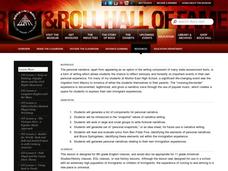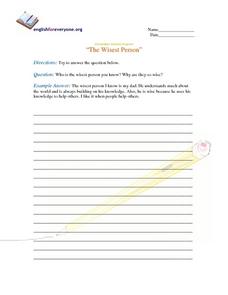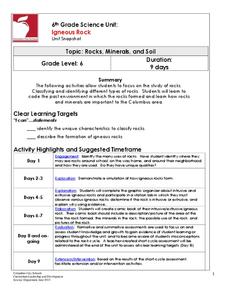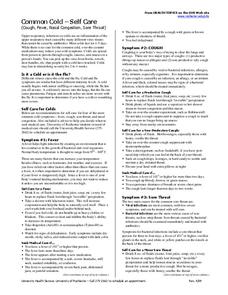Curated OER
A Personal Narrative on the Immigration Experience
The students create a personal narrative on their experiences with immigration. In this lesson, students are asked to read and understand examples of narrative writing as well as evaluate lyrics from Ben Folds Five to determine elements...
Curated OER
Teaching The Personality Profile
Students write a comprehensive personality profile feature that demonstrates knowledge of the Wall Street Journal formula of feature writing and the concept of show, don't tell. They experience a press conference interview situation.
Curated OER
Pioneer America: Legendary Westerners - Can One Person Really Make a Difference?
Fourth graders research famous Americans from the Westward Movement and complete an interview. In this Westward Movement instructional activity, 4th graders work in pairs to research someone who was important during this time period....
Curated OER
Using Personal Connections to Build an Understanding of Emotions
Young scholars make happy and sad masks to examine their personal emotions, allowing them to verbally express their feelings and learn abstract concepts. They use their masks also to help them categorize their emotions and later chart them.
Curated OER
Writing in First Person about the Atlantic Slave Trade Lesson Plan
Students investigate the Atlantic slave trade. In this slavery lesson, students watch "Slavery, Society, and Apartheid," as well as "Slave Ship." Students discuss the information presented in the videos, especially St. John's Revolt....
Curated OER
Personal Portraits
Students create their own self-portrait or a portrait of someone they know well.
Curated OER
The Wisest Person
In this journal writing learning exercise, students answer the question: Who is the wisest person you know? And why? The learning exercise provides space for a rough draft as well as a final draft.
Curated OER
Personal Writing
Students will create a final published personal writing integrating what they have already written with more details as well as correct spelling and punctuation. They ask themselves questions about each event they have written.
Positively Autism
"When I Feel Angry" Social Skill Story
Here's a presentation that shows kids appropriate ways to behave when they are feeling angry. They learn how to identify when they are feeling angry, calming strategies they can use, and words they can use to express their anger. The...
Odell Education
Reading Closely For Textual Details: Grade 8
Only a thorough understanding of history can save us from repeating it. Practice close reading skills with an eighth grade unit that focuses on 19th century America, including European immigration into Ellis Island and Frederick...
Columbus City Schools
Igneous Rock
These rocks are HOT! Well, they used to be, anyway. Take young geologists on a two-week journey through the life and times of the average igneous rock. Lab groups work together to hypothesize about intrusive and extrusive igneous...
Google
Interland
"Be Internet Awesome" is the motto in a super cool digital citizenship interactive created by Google. Interland is made up of four lands that explore the importance of digital safety and helps young Internet users to be alert, strong,...
US Institute of Peace
Simulation on Northern Ireland: One Step at a Time - The Derry March and Prospects for Peace
Where does tradition fit in a divided community with violence on both sides? Scholars learn about the marches in Northern Ireland and the many issues surrounding them. They take on roles in the community and try to convince others of...
Baylor College
Pre-Assessment: The Brain
Break your class in to the general structure and function of the brain. Brainiacs discuss what they know about it and create personalized brain development timelines. They also take a true-false, pre-assessment quiz to get them thinking...
Curated OER
Exploring the Personal Narrative
Students define the characteristics of a personal narrative, explain the difference between a 'memoir' and an 'autobiography', and create a reading journal in which they will log their reading activities. In this personal narrative...
Curated OER
Making a personal brochure
Seventh graders prepare brochures that connect their date and year of birth with a famous person, a family memory and a significant world event, as well as the meaning or significance of their first name.
University of North Carolina
Clichés
When it comes to writing, cliches are as old as dirt. A handout on tired phrases provides examples of cliches, as well as a description of the negative effects they have on a paper. Writers discover specific words and phrases to avoid,...
PBS
Stories of Painkiller Addiction: Contemplating Nature vs. Nurture
Does having an addict in your family make it more likely to become one yourself? Explore the genetic risk factors, as well as the prominent environmental influences, for substance addiction in a lesson that encourages awareness and open...
West Virginia Department of Education
Oral Health Education Resource Kit
Brushing, flossing, a healthy diet, and personal hygiene are keys to good oral health and the information, the activities, and the experiments included in this packet will go a long way toward encouraging your class members to...
Kansas Poets
Persona Poem
Young poets are asked to craft a poem in the voice of a first person narrator, a dramatic monologue of sorts, that reveals not only a dramatic situation but something of the narrator's character as well.
Earth Day Network
Healthy Earth, Sick Earth
Earth is sick and needs our help! Read the children's book Planet Earth Gets Well to explain the various problems facing the planet, discussing what young conservationists can do to heal the planet along the way. A great Earth...
Itsy Bitsy Fun
Reading Comprehension Worksheet
Practice color words and following instructions with a set of worksheets. Kids read each description on the side of the page about a person's hair color and clothing colors, and color the parts of the illustration accordingly.
University of Rochester
Common Cold – Self Care
When kids enter school, they often bring home new illnesses. Decode their symptoms, and help them to take care of themselves, with a fact sheet about the common cold. It delineates the symptoms one would experience as well as the signs...
Centers for Disease Control and Prevention
Understanding the Epidemiologic Triangle through Infectious Disease
Introduce infectious diseases and the epidemiologic triangle. A helpful resource describes the agent, host, and environment from the three vertices as well as the time factor, which is in the middle. Scholars complete a simple...

























